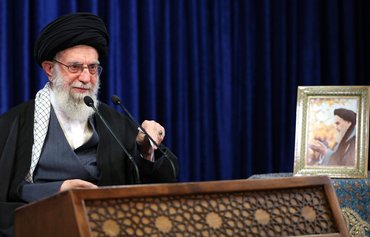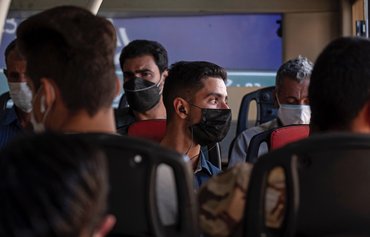Even after the US approved the sale of COVID-19 vaccines to Iran, the Islamic Republic has continued its anti-US rhetoric regarding payment logistics.
The US Treasury Department's Office of Foreign Assets Control (OFAC) on Saturday (December 26) authorised the sale of vaccines to Iran.
Central Bank governor Abdolnaser Hemmati on December 24 announced that Iran has allocated some $244 million to purchase 16.8 million doses of the COVID-19 vaccine through COVAX.
COVAX is a multi-agency group dedicated to ensuring middle and low-income countries' fair access to vaccines.
Meanwhile, Iran's Red Crescent Society said Monday it will receive a batch of coronavirus vaccine developed by Pfizer Inc. and BioNTech SE within three weeks.
Some 150,000 shots of the vaccine will be sent to Iran "in collaboration with a group of philanthropists in the United States", the organisation's director Karim Hemmati was quoted as saying by the semi-official Tasnim news agency. It did not provide further details.
Iran's Health Ministry says it needs over 40 million doses of vaccine to fight the pandemic.
Blaming mismanagement on sanctions
Iran has the highest rate of coronavirus infection in the Middle East.
As of late December, over 1.2 million Iranians have contracted COVID-19, some 54,000 of whom have died. Even Iran's health officials admit the number of infections and deaths are much higher than official statistics indicate.
Both the Rouhani administration and the Islamic Revolutionary Guard Corps (IRGC), which is partly responsible for managing the ongoing coronavirus crisis, have been largely unsuccessful in controlling the outbreak.
They have resorted to false narratives to conceal their own mismanagement.
While the Iranian regime has bungled its response to the COVID-19 crisis, it has repeatedly blamed US sanctions, under the maximum pressure campaign, for the shortage in essential medications for the Iranian people.
Now, it is once again blaming the US, this time for the purchase of a vaccine.
Previously, Rouhani and other Iranian officials criticised the US for "using sanctions to restrict Iran's bank transactions", saying that due to these restrictions, they were unable to purchase the vaccine via COVAX.
But on December 21, Ali Motahhari, former deputy speaker of Iranian parliament (Majles), who was disbarred from running in the most recent Majles election, said Iran's failure to join the Financial Action Task Force has led to Iran being blacklisted, and thereby losing its share of eight million COVID-19 vaccines.
While Iran had several ways to obtain a coronavirus vaccine, it has come up with repeated excuses for not doing so.
First, Rouhani refused to name the country where he had "ordered the purchase of vaccines", and then he blamed US sanctions for being unable to buy the vaccine. Now that the US has approved the sale, he is yet again blaming the US.
A day after OFAC approved the sale, Iranian President Hassan Rouhani told his administration's coronavirus response team that Iran intends to transfer money for the purchase from a third country, which he did not name.
Rouhani criticised OFAC for mandating the sale through a US bank.
He said that while "OFAC had initially said there is no problem with using a third country to channel the money, now it demands that the money be transferred through a US bank".
Just as the Iranian government falsified facts about the spread of coronavirus early on in the pandemic, it has spun the narrative and changed its statements almost daily about the procurement and delivery of a vaccine, observers say.

![The Iranian regime has changed its narrative about its ability to purchase the coronavirus vaccine several times. The US on Saturday (December 26) authorised the sale of vaccines to Iran. [Photo via Etemadonline.ir]](/cnmi_am/images/2020/12/28/27686-Iran-COVID-vaccine-600_384.jpg)






